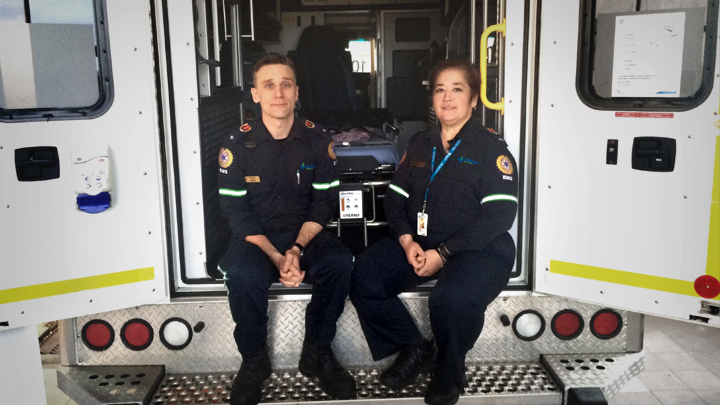
May 26, 2016

EMS emergency communications officer Nadeen LaBoucane, right, shares a moment with her colleague and peer support Ben Penner, who has helped her back to mental health.
Story by Shelly Willsey; Photo by Shelly Willsey
EDMONTON — Nadeen LaBoucane’s darkest day came in early February this year; she felt she was in a deep, dark hole and attempted to take her own life.
The emergency communications officer — a 20-year veteran of Edmonton’s Emergency Medical Services (EMS) team for Alberta Health Services (AHS) — had earlier sought treatment for depression and anxiety, but found her prescriptions affected her ability to think clearly and act appropriately.
When colleagues confronted her about her strange behavior, she became upset, drove to a remote location and overdosed on the same medications that were intended to treat her.
“I derailed that night. I felt alone, really alone,” she says. “I felt like my time was done and I was not needed anymore. My self-worth took a beating and I was the assailant.”
It was the phone call she made to an EMS peer support colleague that saved her life.
“My peer support, Ben Penner, tried to convince me to go to the hospital, but my pride got in the way and there was no way I was going to present to the hospital in full uniform,” says LaBoucane. “He called the RCMP who found me, unconscious, and got me to a hospital.”
With earlier experience as an EMT on the road, LaBoucane has now worked in EMS’ Central Communications Centre (dispatch) for five years.
“People don’t realize that dispatch is the ‘first’ first responder,” says LaBoucane. “Tough calls stayed in my head. It’s traumatic to hear someone shoot themselves, or to talk to a parent after they’ve discovered their teenage son’s body. We talk to people on the worst day of their lives.”
When LaBoucane realized she was struggling, in addition to her medications she decided to take advantage of online and personal counseling. She started talking to a colleague from EMS’ peer supports and the Critical Incident Stress Management (CISM) team.
CISM is a provincial peer support program for EMS workers — created and run by people who’ve been in similar situations. The program aims to support EMS staff in dealing with difficult calls, or the emotional saturation and compassion fatigue that can accompany years in the field.
“This is one way of showing compassion to our caregivers and recognizing that this work is hard,” says Careen Condrotte, provincial co-ordinator for CISM/peer support programs with AHS EMS. “Talking to peers about their experiences can offer validation that they’re not crazy. They’re just a normal person having normal reactions to an abnormal event.”
About 100 EMS personnel currently make up the CISM/peer support team, which continues to grow.
“The program is all voluntary,” says Condrotte. “If someone says they’re fine, we respect that — unless we have reason to believe that they’re not fine or they’re at risk to themselves or others. We leave the door open though, so if things change they can give us a call. Don’t be afraid. If you’re not fine, say you’re not fine.”
The EMS Psychological Health and Safety Committee is also developing additional programs and supports to ensure staff have the appropriate help before, during and after a psychological health issue.
Through the help of the CISM team, community mental health resources, and the support of her EMS leaders and colleagues, LaBoucane returned to work in March.
She says she’s found new joy in training her dog, Tali, enjoys time with her family and friends, and continues to talk to Ben, her peer supporter.
“I am a work in progress,” says LaBoucane. “I live with the shame and embarrassment of what I have done, but there needs to be some sort of good come of it. I am telling my story — not for attention, admiration, or sympathy — but to help reduce the stigma of mental illness, and to hopefully make someone else feel less alone.”
Related Blog: Back from the brink: an EMS story of courage (May 26, 2016)